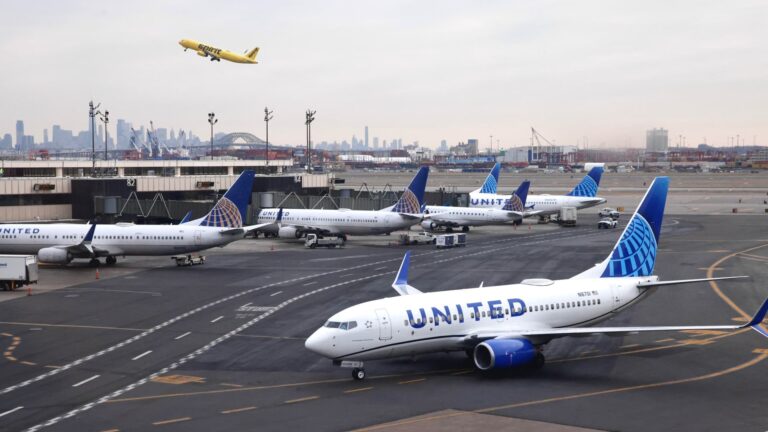A Spirit Airlines jet takes off above two United Airlines airplanes at Newark Liberty Airport on March 23, 2018 in Newark, New Jersey.
Gary Hershorn | Getty Images
Spirit Airlines is ending service in a host of U.S. cities this fall as it fights for survival. Its rivals, meanwhile, are circling its customers, and one is preparing for the possibility the budget travel icon shuts down altogether.
United Airlines on Thursday put on sale a slew of new flights in cities where Spirit operates, like its home base of Fort Lauderdale, Florida, and Orlando, Florida, as well as Las Vegas, Houston and Chicago.
“If Spirit suddenly goes out of business it will be incredibly disruptive, so we’re adding these flights to give their customers other options if they want or need them,” Patrick Quayle, United’s senior vice president of global network planning and alliances, said in a news release.
The new service starts Jan. 6.
Last week Frontier Airlines, the second-largest budget airline in the U.S. behind Spirit, announced 20 new routes that compete with Spirit.
Meanwhile, in October, Spirit is exiting Albuquerque, New Mexico; Birmingham, Alabama; Boise, Idaho; Chattanooga, Tennessee; Columbia, South Carolina; Portland, Oregon; and Salt Lake City, as well as Oakland, San Diego, Sacramento and San Jose in California, the carrier told CNBC on Wednesday. It is also axing plans to start service in Macon, Georgia, on Oct. 16.
“We apologize to our Guests for any inconvenience this may cause and will reach out to those with affected reservations to notify them of their options, including a refund,” Spirit said in an emailed statement.
Some of United’s additional flights include service between the New York area and Columbia and Chattanooga. United is also adding additional flights between Houston, Chicago and Los Angeles, as well as several additional daily roundtrip options like Los Angeles to Las Vegas, and Chicago to Orlando, Fort Lauderdale, New Orleans and Las Vegas, among others.
Frontier has the most seat overlap with Spirit at 39%, while United has 18%, according to TD Cowen analyst Tom Fitzgerald.
Several analysts have said they expect full-service airlines will benefit from Spirit’s troubles. Many of those carriers have big global networks to serve customers, as well as a basic economy, no-frills product that competes with Spirit and other low-cost airlines.
With larger airlines “improving onboard product (premium, free Wi-Fi, inflight entertainment) and network expansion, consumers are increasingly choosing network airlines like Delta and United over the historical market disruptors,” Melius Research analyst Conor Cunningham wrote in a note on Wednesday.

Back to court
Spirit Airlines filed for its second Chapter 11 bankruptcy protection in a less than year last week after it faced weaker-than-expected demand and continued high costs when it exited its earlier bankruptcy in March.
The carrier didn’t make the more painful, deeper cuts that are common in bankruptcies the first time it filed, and it’s now facing those choices now.
Upon filing its second bankruptcy petition, Spirit last week said it would further scale down its network and shrink its fleet, cuts that it said will reduce costs by “hundreds of millions of dollars” a year.
“Since emerging from our previous restructuring, which was targeted exclusively on reducing Spirit’s funded debt and raising equity capital, it has become clear that there is much more work to be done and many more tools are available to best position Spirit for the future,” Spirit CEO Dave Davis said in a news release on Friday.
In a court filing in December, Spirit forecast a net profit of $252 million this year. But in August, it said it instead lost nearly $257 million since March 13, after it exited Chapter 11, through the end of June.
Spirit warned earlier in August that it might not be able to survive a year unless it significantly increased its cash.
It also said its credit card processor was seeking additional collateral. It then borrowed the entire $275 million available under its revolving credit facility and said that the card processor could hold back up to $3 million a day from the airline. Even before bankruptcy, Spirit had planned to furlough hundreds of additional pilots this fall.

